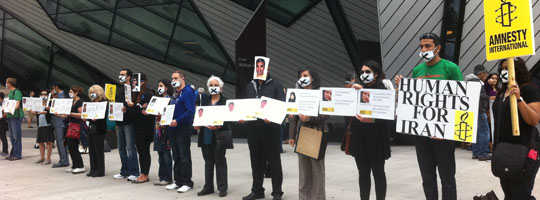Sima Sahar Zerehi – In June 2009 we made an election under a theocratic government count – many decided to vote and dare ask “Where’s my vote?” Even some expats in Toronto, New York, Paris, London and Rome decided to caravan to the Iranian embassies to mark their choice for what many believed was the lesser of the evils.
We knew our candidates were hand picked for us; they thought that a rigged election was sure to make us stay home. But this was a fight we thought we could win, after all it was reform and not revolution that we were after.
Although a record number of eligible voters cast their ballot, they didn’t even bother to pretend to count our vote before announcing the results of their fraudulent election. So we took to the streets for our democratic rights, but soon the wave of protests took on new meanings and dimensions, a right to vote became a right to speak, to write, to have a voice.
They too came onto the streets en mass: the secret forces, the police, the thugs on motorbikes, the brutes with batons, the hired guns armed with bullets and tear gas.
Soon we were fighting for our lives, for our freedom –we didn’t have enough time to sort out our analyses to examine the dimensions of our struggle, to decide on a course forward, to debate isms, tactics and basis of unity. We shared our messages via unedited YouTube clips and abbreviated tweets, there was no interval to generate political doctrines, no opportunity to do anything more than wrap ourselves around a colour – a symbol – a short hand for an unarticulated desire for change.
Sadistically they subjected us to mass arrests, forced confessions, kangaroo courts, imprisonment, torture and rape.
At nights after the night chants from the rooftops had seceded they came – knocking on our doors, heavy military boots, angry voices, clenched fists, they came for our student leaders, the activist, the journalists, the organizers, the bloggers, even our lawyers were arrested, intimidated, and imprisoned.
The year passed with demonstrations, arrests, and yet more demonstrations. We blogged, tweeted, YouTubed our movements, we became the media and the world was watching.
In 2010 we stood outside the prison walls, huddled masses – mothers, sisters, daughters, and wives, fathers, brothers, husbands, and sons. We stood there in silence – craned our necks hoping to get a glimpse of our imprisoned loved ones. We were prisoners of conscience, political prisoners and survivors of a movement stunted by the inhumanity of a government that didn’t hesitate to brutalize peaceful protestors.
Time passes behind prison walls, dark passages, muffled screams and cries. In our blackest hours we asked did anyone hear our voice?
In 2011 we saw how the winter of our discontentment had ushered in the Arab Spring. We realized that our calls for freedom and democracy had ignited the fires of resistance across North Africa and the Middle East – we witnessed young people like ourselves on the streets of Tunisia, Egypt, Yemen, Bahrain, Syria, and Libya.
They were using our mobilizations as a blueprint – they were using social networking sites and citizen journalists in their struggle for change. They were controlling the flow of information, generating stories and mobilizing the masses.
The youth of Egypt and Tunisia were able to topple their dictators and the people of Libya had succeeded in winning the battle for the hearts and minds of an entire world. The Arab world was blossoming with newly sprouting protest movements spearheaded by young people like us.
In the West we saw the regular programming on CNN and BBC be interrupted by the footage of resistance and for the first time the faces of Arab and Middle Eastern youth were associated with freedom and democracy rather than violence and fundamentalism.
Once again we came to the streets joining our movement to the plight of those in neighbouring countries, we were inspired by the mobilizations but also exhausted.
This week we commemorate the second anniversary of the fraudulent Iranian election; it’s been two years of executions, hunger strikes, deaths and disappearances.
After two years of running in and out of the streets, after two years of struggling to breathe, to keep the seed of our struggle alive, we must now take the time to re-assess, re-evaluate, re-invigorate and re-build.
The essential question that remains is: what now? What do we do now to move forward? How to we keep our movement alive? How do we unite our struggles across linguistic and cultural divides? How do we maintain the centrality of youth and women in our struggles? How do we articulate our dreams for a better Iran? What do we want if not this government and how do we achieve social and political change?
In this vein we call upon all academics, theorists, activists, organizers, thinkers and dreamers to submit a short 500-word piece responding to the question what do we do now to advance the Iranian struggle for freedom and democracy?
The best submissions will be published in an upcoming issue of Shahrvand under the heading “Now What?”






I like this suggestion:
http://www.huffingtonpost.com/setareh-sabety/iran-opposition-should-me_b_876918.html?ref=tw